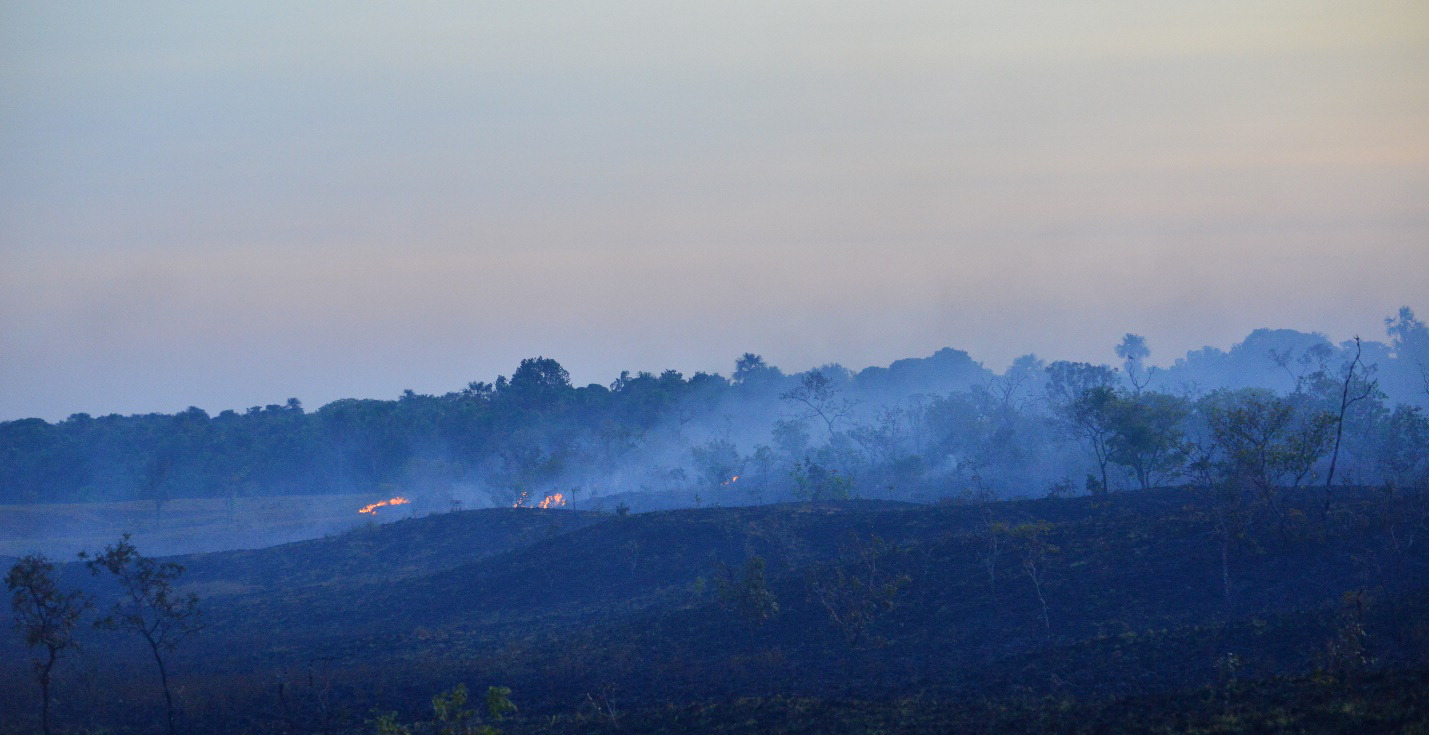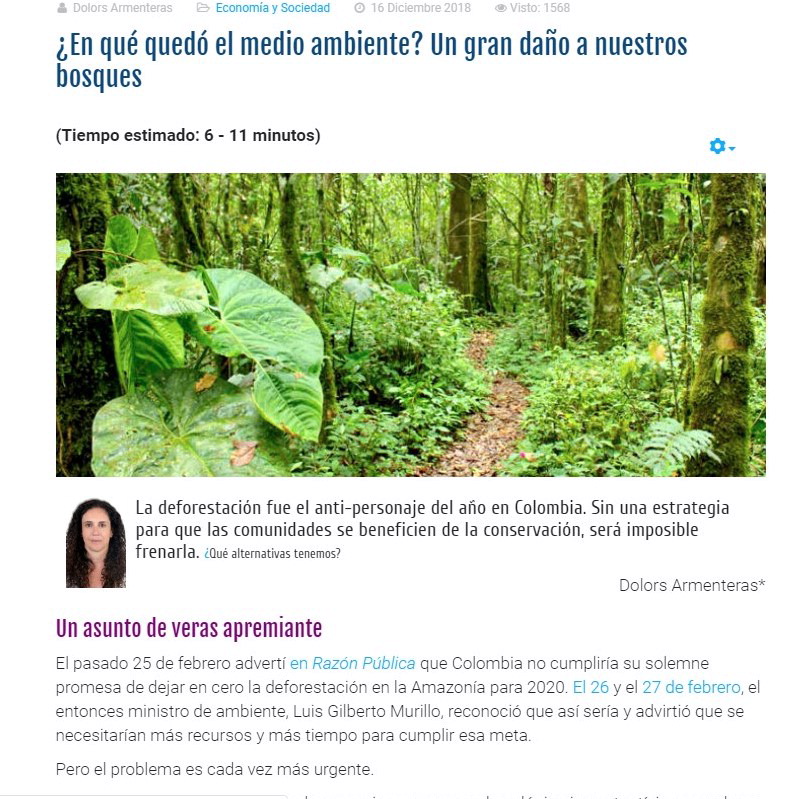Cycle 5 (2015 Deadline)
Degradation of tropical forests in Colombia: impacts of fire
PI: Dolors Armenteras (darmenterasp@unal.edu.co), Universidad Nacional de Colombia
U.S. Partner: Jennifer K. Balch, University of Colorado, Boulder
Project Dates: December 2016 - November 2019
Project Overview
 | | Fires occurring in the Savannah forest in the Bita region [Photo courtesy of Dr. Armenteras] | Tropical forests host the highest levels of biodiversity and maintain some of the greatest carbon stocks of all terrestrial ecosystems, having an essential role in global carbon cycling. Colombia is no exception and hosts a diversity of tropical forests that are not only rich in both carbon and species but also highly threatened. Colombia has made advances in quantifying carbon stocks and measuring emissions from deforestation but has yet to address the drivers and consequences of forest degradation.
Recent studies have identified fire as a major driver of tropical forest degradation. Fires affect landscape structure, patterns, and processes and have shaped species composition and biological diversity. However, fires have also been used more recently as a tool in management practices for land clearance, crop or pasture maintenance, and slash-and burn agriculture in tropical forest systems. Though a natural mechanism in many ecosystems, human actions have altered regimes and the extent and frequency of fires have increased in many regions of the world, particularly in tropical forests.
This PEER project aimed to advance understanding of the interactions of fire frequency and intensity on the resulting biomass depletion and carbon stocks in different types of forests, assess how fuel load and fuel moisture change along forest types and develop a model to quantify the response of different types of forests to changing fire regimes. This work sought to develop the ability to include estimates of carbon emissions from forest degradation caused by fire into end-user decision-support systems and provide a basis of knowledge that will help reduce threats to agriculture systems.
Final Summary of Project Activities
 | During multiple field campaigns, the PI and her team sampled plots of burned interior forest, burned forest edge areas, and non-burned forest, resampling sites across different time periods. Their study plots included locations inside El Tuparro National Park and Iguaque Flora and Fauna Sanctuary. They studied the composition and structure of forests affected by fire, determined the fuel load of these forests, and analyzed the changes in soil carbon, moisture, and nutrients. The team built an integrated database and dataset maps of their results and developed a fire policy for publication and policy briefs for the Colombian House of Representatives and Senate and the Bogota Local Council. They also presented at the Brazilian Symposium of Remote Sensing and Max Planck Symposium/Colombia Frontiers of Science. The PEER team participated in a fire management workshop in Vichada with private sector stakeholders and organized a workshop in Boyaca with government representatives to discuss their results, fire ecology case studies, and gather potential future actions.
Based on their review of the national and international political context and the gaps they identified in the management of forest fires, the team also worked to contributing to formulation of a draft National Law that addresses the causes and management of forest fires to aid in territorial planning and Colombia’s overall development. A key point is to encourage academia in Colombia to become a leading actor for the country to enter a transition phase, from a paradigm based on the suppression of fire to the adoption of policies based on compression and integral fire management.
In the light of the raging fires in the Amazon, Dr. Dolors Armenteras and her work on forest fires have received increasing media attention. On August 23, 2019, Dolors gave a live-streamed interview to the national newspaper El Tiempo on the impacts of deforestation, national regulations, and actions to be taken to reduce the risks of forest fires. On September 2, 2019, El Tiempo published an article on preparation of a draft bill on integral management of fires, featuring Dolors.
The PI and her team continued their work on fire ecology and translating results into policy in Colombia with support from an award under PEER Cycle 8.
Publications
Tania Marisol González, Juan David González-Trujillo, Alberto Muñoz, Dolors Armenteras. 2021. Differential effects of fire on the occupancy of small mammals in neotropical savanna-gallery forests. Perspectives in Ecology and Conservation 19(2): 179-188. https://doi.org/10.1016/j.pecon.2021.03.005
Dolors Armenteras, María Constanza Meza, Tania Marisol González, Immaculada Oliveras, Jennifer K. Balch, and Javier Retana. 2021. Fire threatens the diversity and structure of tropical gallery forests. Ecosphere 12(1): e03347. https://doi.org/10.1002/ecs2.3347
Natalia Salazar, María Constanza Meza, Josep Maria Espelta, and Dolors Armenteras. 2020. Post-fire responses of Quercus humboldtii mediated by some functional traits in the forests of the tropical Andes. Global Ecology and Conservation 22: e01021. https://doi.org/10.1016/j.gecco.2020.e01021
Dolors Armenteras, Tania Marisol González, Tania Marisol, María Constanza Meza, Imma Oliveras. 2020. Incendios en ecosistemas del norte de Suramérica: avances en la ecología del fuego tropical en Colombia, Ecuador y Perú [Fire in the ecosystems of northern South America: advances in the ecology of tropical fires in Colombia, Ecuador and Peru]. Caldasia 42(1) January-June 2020: 1-16. http://www.revistas.unal.edu.co/index.php/cal
Dolors Armenteras, Laura Schneider, and Liliana Davalos. 2019. Fires in protected areas reveal unforeseen costs of Colombian peace. Nature Ecology & Evolution 3: 20-23. https://doi.org/10.1038/s41559-018-0727-8
Dolors Armenteras, Uriel Murcia, Tania Marisol Gonzalez, Oscar Javier Baron, Jorge Eliecer Arias. 2019. Scenarios of land use and land cover change for NW Amazonia: Impact on forest intactness. Global Ecology and Conservation 17: e00567. https://doi.org/10.1016/j.gecco.2019.e00567
Dolors Armenteras and Thomas Defler. 2019. Colombia: a new plan imperils Amazon. Nature 569, 487. https://doi.org/10.1038/d41586-019-01615-7
Dolors Armenteras, María Constanza Meza, Tania Marisol Gónzalez, Natalia Salazar, Joan Sebastian Barreto, Laura Mesa, Carlos Julian Moreno, Laura Obando, Santiago Ruiz. 2019. Estado del conocimiento de la ecología del fuego en Colombia :síntesis de hallazgos y aplicaciones [Status of fire ecology knowledge in Colombia: summary of findings and applications]. Available online at https://pdf.usaid.gov/pdf_docs/PA00X4MW.pdf [Spanish] and https://pdf.usaid.gov/pdf_docs/PA021D4T.pdf [English]
María Constanza Meza, Tania Marisol González, and Dolors Armenteras. 2019. Propuesta para el manejo integral del fuego en Colombia [Proposal for an integrated fire management in Colombia]. Available online at https://pdf.usaid.gov/pdf_docs/PA00X4MX.pdf
Rafael B. de Andrade, Jennifer K. Balch, Amoreena L. Parsons, Dolors Armenteras, Rosa Maria Roman-Cuesta, and Janette Bulkan. 2017. Scenarios in tropical forest degradation: carbon stock trajectories for REDD+. Carbon Balance and Management 12: 6. https://doi.org/10.1186/s13021-017-0074-0
Selected News Coverage
RCN Radio article: https://www.rcnradio.com/estilo-de-vida/medio-ambiente/la-amazonia-brasilena-esta-cerca-del-punto-de-no-retorno
News media in Brazil: https://www.razonpublica.com/index.php/internacional-temas-32/12229-por-que-arde-la-amazonia.html
Back to PEER Cycle 5 Grant Recipients
|





